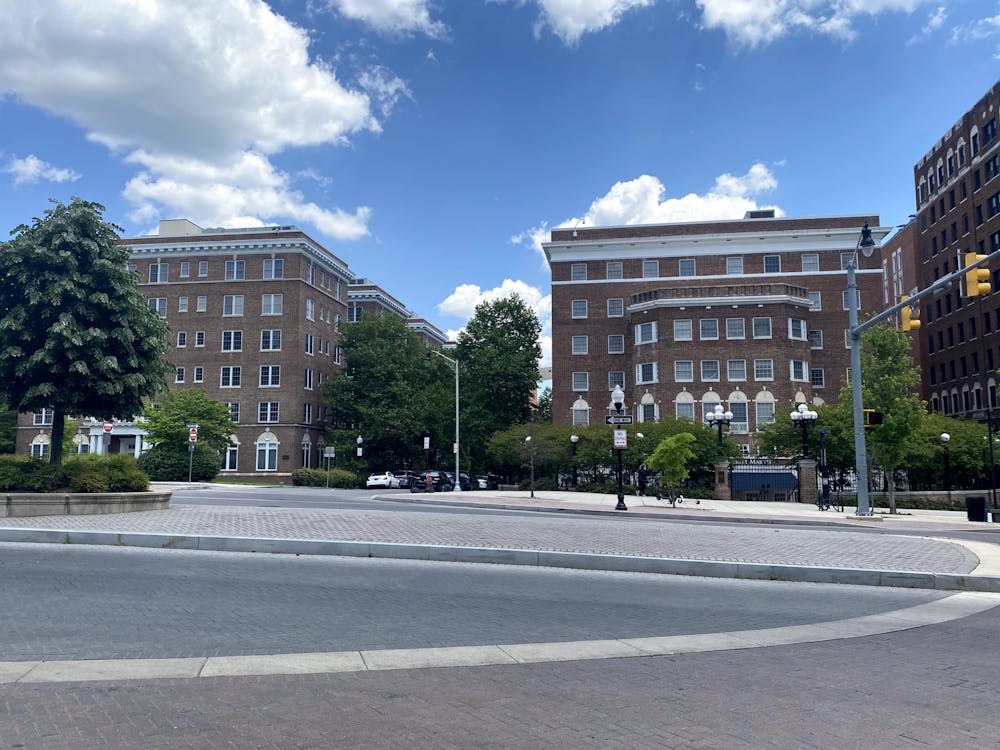In an email sent to undergraduate students on April 6, the University reinstated several COVID-19 safety protocols in response to the rise in cases after spring break. Over 100 students have tested positive for COVID-19 since April 1, and the campus dashboard reported 64 confirmed cases on April 5 and 26 on April 6.
Effective this week, all undergraduates are required to test twice weekly until at least April 22. Self-testing kits are also available to supplement the mandatory bi-weekly saliva tests and can be picked up from AMR II or Wolman Hall.
Additionally, the masking requirement is temporarily reinstated in dining facilities and residence halls, a partial reversal of the University’s relaxed indoor masking policies that had been effective since March 9.
Vice President for Communications Andrew Green discussed the University’s reasoning for this policy change in an email to The News-Letter.
“The decision to reinstate masking in those particular locations reflects an assessment of the areas of greatest risk,” he wrote. “As we have throughout the pandemic, we will continue to consult with our experts in public health and infectious disease and make adjustments as circumstances warrant. Many students, faculty and staff have continued wearing masks even when not required to, and we support that choice.”
Freshman Jake Rasmussen wrote in an email to The News-Letter that while he questions the decision to lift the indoor mask mandate prior to Spring Break, he also does not agree with the locations the University designates as causing transmission.
“It felt like the administration was lifting the mask mandate knowing that cases would surge when students returned to campus,“ he wrote. “I still personally disagree that there is transmission in places like dining halls, residential halls...etc. rather than public gatherings out of the University’s jurisdiction, but I understand the administration is doing what is in their control.”
Freshman Neha Tripathi expressed mixed feeling about the policy changes in an email to The News-Letter.
“I’ve been a little worried about COVID-19 since I’ve been hearing about so many case incidences,” she wrote. “I find it a little annoying we have to wear masks in our residence halls — I spend about a minute within my residence hall excluding my actual suite, so I don’t see the value in this change.”
Freshman Corina Mills wrote in an email to The News-Letter that she does not understand why required masking is only being temporarily reinstated in certain locations.
“If the COVID-19 situation on campus is bad enough to reestablish previous harsher guidelines, it doesn’t entirely make sense to do it only in certain places but not others,“ she wrote.
As described in a previous update by the University, in order to accommodate the isolation housing inventory, on-campus residential students may be required to isolate in place, and isolation housing will not be provided for those who live off campus. According to the email, prioritization for off-campus isolation housing will be given to those who present more serious cases of COVID-19 or those for whom quarantining in their living place would be difficult.
For those required to isolate in place, meals and mail will be delivered to them and laundry and trash services will also be available.
Green explained that isolation housing capacity has fluctuated throughout the pandemic in response to public health conditions. Due to the spike after spring break and subsequent exposures to COVID-19 positive individuals, students are currently being housed at the Inn at the Colonnade, the Mt. Washington Conference Center and the Marriott Residence Inn in East Baltimore.
Sophomore Megan Humphrey, who is currently in isolation housing at the Mt. Washington Conference Center, described her experience in an email to The News-Letter.
“The food, unfortunately, has been less than appetizing and all 3 meals are delivered at once, around 1 pm, and cold,” she wrote. “When I arrived they gave me lots of water/drinks but nothing new came today so I'm not exactly sure if the ones I got on the first day are supposed to last me the whole time.”
Freshman Yagmur Ozturk, who is also in isolation housing at the Mt. Washington Conference Center, depicted similar experiences in an email to The News-Letter.
“Mt. Washington is definitely not the best place. We get one delivery a day of everything breakfast, lunch and dinner already cold. You can’t make any sort of selection and you have to heat up your meals throughout the day,” she wrote. “If they did some sort of food app option that would have been so much better.”
Humphrey stated she has been ordering meals from nearby to the hotel’s front desk because she has not found the meals appetizing.
“I ordered both my meals today to the front desk and I will probably be doing that the whole time I'm here, which is disappointing considering the extensive menu those at the Inn at the Colonnade seem to have,” she wrote. “I know I'm really privileged to be able to order extra meals.”
Humphrey noted that she has felt supported by the University during her experiences, reporting that her case manager has been kind and her professors have been accommodating to her situation.
Green discussed how logistical challenges have resulted in differing experiences across isolation housing locations.
“Moving students to isolation housing off campus involves a lot of logistical coordination from food service to transportation and followup health care checks. This sometimes results in some challenges — for example the fact that at Mt. Washington, food must be prepared off site and delivered,” he wrote. “We very much appreciate the feedback we have received from students and are doing our best to ensure that they are safe and well cared for during a stressful time.”
Aashi Mendpara contributed reporting to this article.





